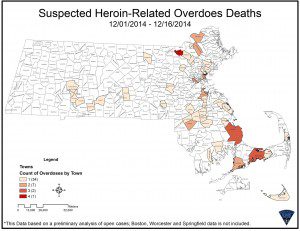 BOB SALSBERG, Associated Press
BOB SALSBERG, Associated Press
BOSTON (AP) — Tackling the scourge of heroin and opiate addiction will be an early priority after taking office, Gov.-elect Charlie Baker said yesterday as state police reported dozens of suspected overdose deaths around the state in recent weeks.
“It cuts across geography. It cuts across class. It cuts across everything,” the Republican said. “That is something we are going to focus on early on.”
Baker, asked about legislative priorities during a visit to the Statehouse, called the addiction crisis a huge problem in Massachusetts and said he would seek a comprehensive solution after he is inaugurated Jan. 8.
In an unrelated statement issued later in the day, Col. Timothy Alben, the state police commander, said detectives assigned to district attorneys’ offices around the state had responded to 58 suspected heroin or opiate related deaths since Dec. 1. He said investigators were examining evidence to determine if there were any “common patterns or similarities” in the composition or source of the suspected drugs.
“One area in which there are no commonalities are the locations of these suspected overdose deaths,” Alben said, echoing Baker’s comment about the widespread nature of the problem.
“They are occurring in cities and towns, large and small, urban, suburban and rural, in all regions of the state,” he said.
Alben said the reported deaths in recent weeks did not include any that might have occurred in Boston, Worcester or Springfield — the state’s three largest cities — since they do not report data directly to state police.
Sharp spikes in heroin-related deaths have occurred before in Massachusetts, including at least 185 reported during the four-month period of November 2013 through February 2014.
During his gubernatorial campaign, Baker outlined several steps he would take for dealing with addiction, including a “frank discussion” with doctors about pain treatment with the objective of reducing prescriptions of highly addictive painkillers. He also called for enhanced treatment options and creation of a central database for tracking heroin overdoses around the state.
Baker said yesterday that jump-starting the state’s stalled medical marijuana rollout would also be an early priority, as would addressing a state budget gap estimated at $329 million by outgoing Democratic Gov. Deval Patrick’s administration but even larger by the independent Massachusetts Taxpayers Foundation.
Baker has not specified how he plans to address the deficit besides ruling out new taxes or cuts in aid to cities and towns, and he said he hadn’t discussed the budget with legislative leaders.
Baker spoke after meetings with state Auditor Suzanne Bump and Secretary of State William Galvin, both Democrats. He also attended a farewell party for retiring state Rep. George Peterson, R-Grafton, the assistant House minority leader.
Below is State Police Colonel Timothy Alben entire statement regarding suspected heroin deaths across Massachusetts:
“Since December 1st, Massachusetts State Police Detectives assigned to our District Attorney’s Offices across the state have responded to 58 suspected heroin/opiate related deaths across the state. Our investigators, working in conjunction with local police, draw these preliminary conclusions based upon evidence located at death scenes and interviews with witnesses, family or friends. The department is currently cataloguing and comparing evidence to determine whether any common patterns or similarities exist in terms of the composition, brands, or sources of the narcotics. That effort is ongoing and we have reached no conclusions as of yet. One area in which there are no commonalities are the locations of these suspected overdose deaths. They are occurring in cities and towns, large and small, urban, suburban and rural, in all regions of the state. Based on many years of investigative work, we know that narcotics purchased on the street can have widely varying concentrations and may contain toxic chemical additives or impurities. While the causes of these deaths are suspected overdoses, the official cause of death will not be confirmed until the Medical Examiner performs toxicology testing, which generally takes several weeks. The Massachusetts State Police, working with the DEA and local police across Massachusetts, continue to target the illegal drug trade – from the street level, up the supply chain, to major dealers. We recognize, however, that enforcement is but one component in mitigating this public health threat. Treatment and counseling strategies currently being employed by public and private health agencies offer the best opportunities for assistance with substance abuse issues. We raise these concerns in the hope that families, friends and acquaintances of those suffering from addiction might better understand the hidden dangers of heroin use and direct those with addictions to sources of help and rehabilitation. If one person heeds this message it may prevent the loss of a life.”


